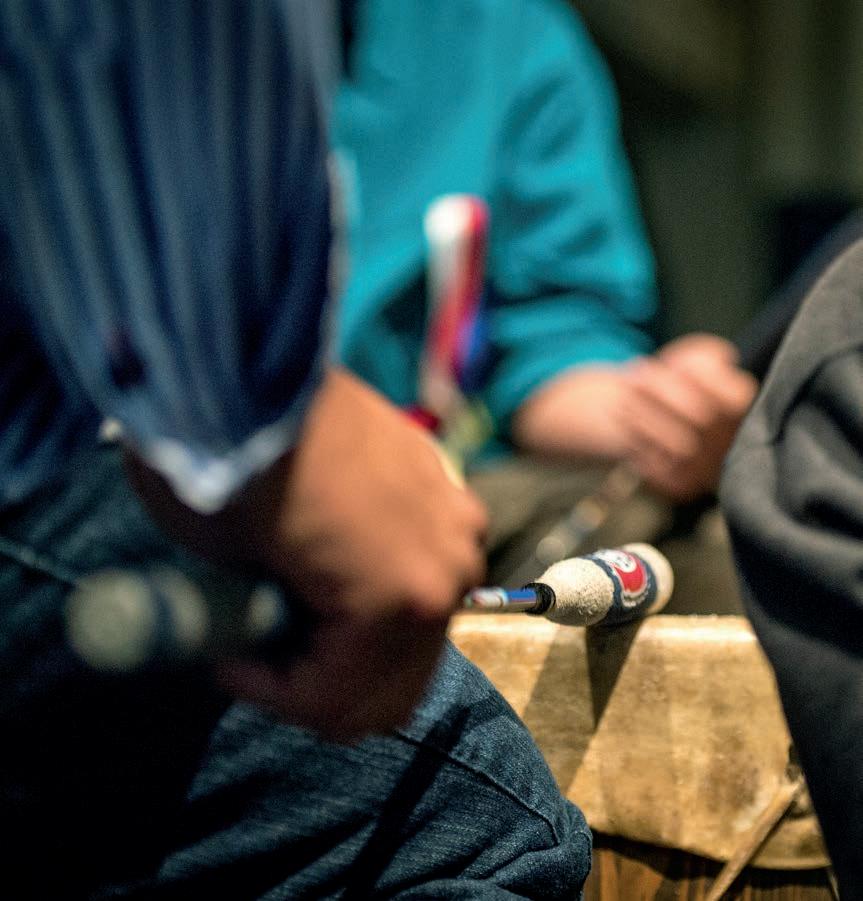
4 minute read
University of Alberta Response
For me, the ISP represents crucial and cutting-edge policy created by and for Indigenous Peoples who are part of the University of Alberta community. Though created over the past few years, the document owes its existence to the thousands of Indigenous Peoples who have walked the halls of this university over the past century and have persevered through times not so welcoming as they are now. In creating this document, we honour those who came before and seek to make the path easier for future generations. Much work remains to be done in the journey of reconciliation between the University of Alberta and Indigenous Peoples, and this document is a critical step in that journey.” Willow White
Assistant Professor, English & Indigenous Studies, Augustana Faculty


Untitled (1981) by Victoria Mamnguksualuk (19302016) of Nunavut is part of the University of Alberta Museums Art Collection. It depicts hunters travelling across the land. (University of Alberta Museums Art Collection; The Clifford E. Lee Collection; 1983.44.17) Let us put our minds together to see what we can build for our children.” –Chief Sitting Bull
“Education is a universal human right, and more and more we are seeing an increase of Indigenous students pursuing university. This is because of those advocating for those voices who have yet to be heard (âhkamêyimok – don’t give up/keep going). The Indigenous leadership within the university is choosing to stand up and no longer be silent for the future generations, for this I am thankful (kinanāskomitin — I thank you).” Dallas Cardinal
Project Co‑ordinator, Supporting Indigenous Languages Revitalization, Office of the Vice‑Provost, Indigenous Programming and Research
Superintendent Brian Wildcat, a U of A grad, visits with students at Ermineskin Elementary School in Maskwacîs, Alta., where his daughter, Devon Wildcat, teaches. The phrase, Nehiyaw Niya, visible on the bulletin board, translates to “I am Cree.”
Affirmation for Action by the University Community
Following the lengthy consultations informing For the Public Good in 2016, the Strategic Plan for Equity, Diversity and Inclusivity in 2018, University of Alberta for Tomorrow in 2021 and the institutional brand in 2021, the University of Alberta made broad and powerful commitments to Indigenous post-secondary education, research and engagement, and to ensuring a response to the Calls to Action issued by the Truth and Reconciliation Commission of Canada (TRC).
This affirmation aims to serve as the university’s visible commitment to respond to the TRC’s Calls to Action and broader indigenization efforts — work that remains urgent.
The calls are at the heart of the work to address the systemic barriers that limit full Indigenous participation in the offerings of the university — historical and contemporary barriers that have artificially prevented Indigenous Peoples from achieving greater individual and collective sovereignty.
In recognizing the great power of education, the TRC noted that universities have a particular responsibility, ability and opportunity to contribute to reconciliation by enacting curricular changes that correct the historic record, by incorporating reconciliation learning, by increasing Indigenous representation in professions, and by eliminating education and employment gaps for Indigenous Peoples. This document reaffirms the university’s commitment to engage with Indigenous Ways of Knowing, Being and Doing in order to acknowledge the deliberate erasure and exclusion of Indigenous knowledge systems. The same power that was employed to disenfranchise Indigenous Peoples can now be brought to bear on the education of the students we serve and those beyond the institution.
The U of A acknowledges that indigenization is an institutional journey that will likely take generations to address. Only intentional, conscientious, systemic changes can move the institution closer to these critical goals.
In the spirit of these understandings — and with an acknowledgment that the work to indigenize the institution touches on every academic, administrative and operational aspect of the university — we, as signatories, affirm our commitment as individuals, as educators, as researchers, as administrators and as leaders to act on Indigenous Initiatives within our units and across the institution.
We invite community members, learners and all those interested in participating in this change, to sign the affirmation at uab.ca/braiding. Through the Indigenous Strategic Plan, the University of Alberta now has a path forward with specific actions to improve the university experience for students and staff. Most significant is that this document will uphold the TRC Calls to Action and UNDRIP, including the International Decade for Indigenous Languages, which recognizes Indigenous Peoples’ rights, language and culture.” Pamela McCoy Jones
Executive Director, Supporting Indigenous Language Revitalization, Office of the Vice‑Provost, Indigenous Programming and Research


As the College of Health Sciences pursues our mandate of advancing the full spectrum of human health and wellness in individuals and communities, we are strongly committed to approaching this challenge through the lens of equity, diversity and inclusion. In particular, we must continue to strengthen our commitment to Indigenous initiatives and leadership as we do this important and necessary work. Contending with the painful Canadian legacy of colonialism must inform every decision we make as we advance systems changes in our teaching, learning and research. Indigenous leaders in the College of Health Sciences are guiding us in challenging past academic approaches, building new ways of knowing, and underscoring the importance of health sciences as a powerful tool for change. There is much to do in our commitment to support Indigenous individuals and communities within our college and in the broader context of our reach, and much of that work will involve acknowledging the ways so many of our systems have fallen short. But the power of this transformation is and will continue to be profound and will build the foundation for a better and stronger collective future.” Greta Cummings
Interim Dean, College of Health Sciences








